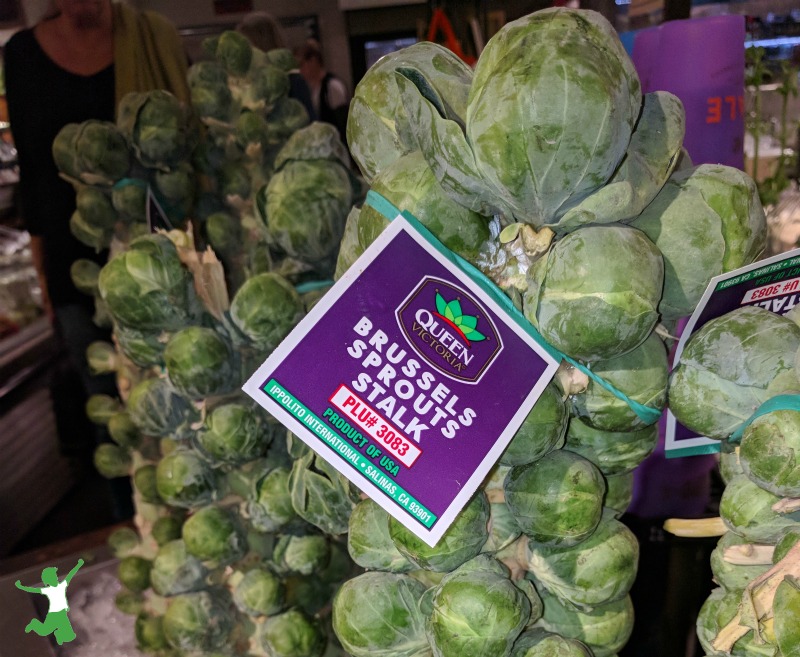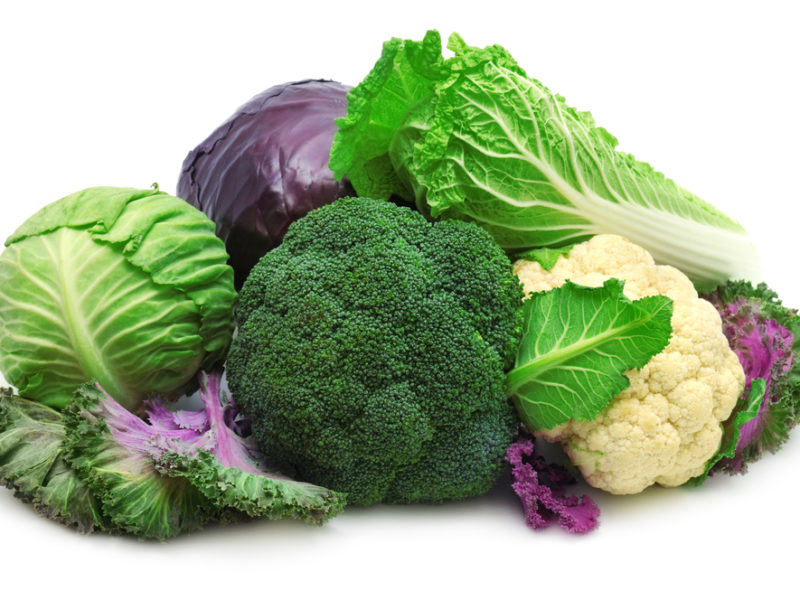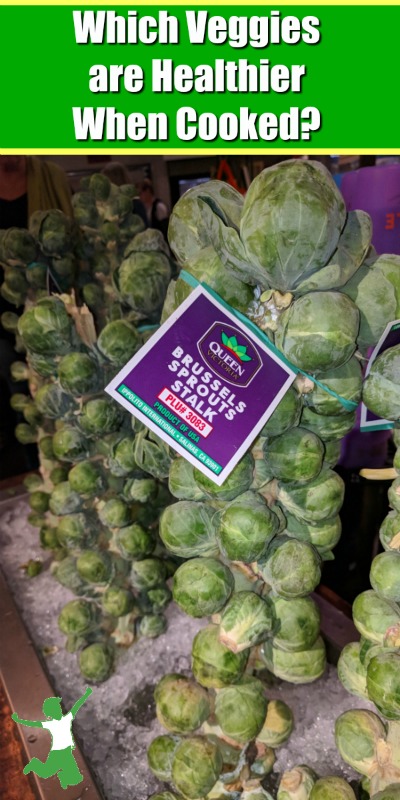Table of Contents[Hide][Show]
Conventional belief is that raw vegetables are always healthier than cooked, but this is not true depending on the plant foods eaten according to lab testing and anthropological evidence by experts in the field.
I stopped by one of my favorite healthfood stores today to pick up a large glass of fresh juice made from organic raw vegetables for an early lunch on the go. As usual, I asked for the a carrot, celery, beet, spinach and cucumber blend. But, hold the spinach. I definitely skipped the green smoothie too!
While this request is usually met with a simple nod by the juice bar attendant, this time the guy looks up and says, “Why no spinach? We have a lot of people that come in here and love the spinach in their juice.”
Ah! Great question!
The truth is that not everything should be eaten raw, especially vegetables!
Some raw vegetables must be cooked else you are actually harming yourself. Below is a rundown of what veggies should not be eaten raw either in whole or juiced form.
Cruciferous Raw Vegetables

Sorry to be the bearer of bad news, but cruciferous vegetables should be cooked before eating as they contain chemicals that BLOCK the production of thyroid hormone in your body! Considering that 2 out of every 3 Westerners are either overweight or obese and this is projected to jump to 75% by 2020, this is of particular importance as folks struggling with weight usually suffer from borderline to full-blown hypothyroidism.
Hypothyroidism is a condition where the thyroid gland does not make enough thyroid hormone, so someone suffering from this condition surely does not want to be eating foods that will block what little thyroid hormone is being produced in the first place!
Symptoms of hypothyroidism include cold hands and feet, thinning hair, fatigue, reduced or nonexistent libido, coarse dry hair, constipation, difficulty losing weight, and depression among many others.
Cooking crucifers reduces the goitrogenic substances by about 2/3. Fermentation does not reduce goitrogens in these veggies, but since fermented crucifers such as sauerkraut are typically eaten as a condiment and, hence, in small amounts, consumption is fine if the diet is rich in iodine.
Here is the list of common cruciferous vegetables that you do not want to be eating raw if you want to protect your thyroid gland!
Arugula, broccoli, kale, maca root, cauliflower, cabbage, turnip, collard greens, bok choy, brussels sprouts, radish, rutabaga, and watercress.
Notice that many of these vegetables are commonly included in fresh veggie juice blends or in salads. While an occasional arugula salad or cup of coleslaw is not going to do harm to most folks, it would be wise not to make a habit of eating/drinking any of these vegetables in raw form. Kale chips are a safe choice too.
Raw Vegetable Greens
Some veggie greens contain a chemical called oxalic acid. This substance is a very irritating to the mouth and intestinal tract. It also blocks iron and calcium absorption and may contribute to the formation of kidney stones.
The good news is that oxalic acid is reduced by a light steaming or cooking. Just be sure to discard the vegetable cooking water.
Veggies containing oxalic acid include spinach, chard, parsley, chives, purslane and beet greens.
Hmmmm. Spinach is known for being high in iron, yet eating it raw will not necessarily give you the iron you want because of the oxalic acid?
Yep, that’s right. Cook that spinach first if you are seeking an iron boost without the indigestion and don’t get hooked on the raw spinach salads!
Don’t stress about munching the parsley garnish on your next gourmet dinner, though. A little bit here and there is not going to cause a problem. Eat a big spinach salad everyday and it is virtually certain you will eventually succumb to kidney stones, according to Dr. William Shaw, Director of The Great Plains Laboratory for Health, Nutrition and Metabolism.
Other Raw Vegetable Cautions
Other vegetables that are best to avoid eating raw include:
- Raw potatoes contain hemagglutinins that disrupt red blood cell function.
- Raw sweet potatoes will give you gas.
- Raw, edible mushrooms such as the common white mushroom contain toxic substances such as agaritine, a suspected carcinogen. These substances are heat sensitive and are neutralized by cooking.
- Raw alfalfa sprouts are mildly toxic and inhibit the immune system. Eating large quantities regularly can make the skin overly sensitive to the sun or trigger autoimmune symptoms that mimic lupus.

Dr. Weston A. Price on Raw Vegetables
A good rule of thumb when considering the best way to consume your veggies is to remember the letter that Dr. Weston A. Price wrote to his nieces and nephews in 1934. In this letter, he strongly urged them to eat their vegetables cooked in butter. His research found that the bulkiness (fiber) of raw vegetables interfered with the human body’s ability to extract minerals from them via the digestive process.
So, should you drink your veggies raw? Of course. Raw vegetable juice made from veggies that are safe to consume uncooked is a wonderful way to get a fast infusion of easy to digest, colloidal minerals. It is also highly alkalizing to the body and a proven way to gently detox the gut.
The great thing about veggie juice is that the fiber is removed, which is the “bulkiness” that Dr. Price found interfered with the mineral absorption.
However, if you are going to eat the fibrous portion of the vegetable, it is best to cook them in butter as advised by Dr. Price to enhance the availability of the minerals. The fat in the butter permits greater absorption of the minerals, and besides, buttered veggies taste fantastic!
References
Nourishing Traditions
The Role of Oxalates in Chronic Disease, William Shaw PhD (Director of The Great Plains Laboratory for Health, Nutrition and Metabolism)
More Information
Best Green Juice for Congestion
Nightshade Vegetable Contraindications
Cleansing Myths








Adam, you are absolutely right .. I am not at all interested in vaccination pseudo science as cooked up and presented as facts to the public. Being from a medical family, I’ve seen all the games that are played by Big Pharma to protect and expand profits and I am only interested in the true facts and unbiased science on this blog. “Science” isn’t all that it seems sometimes and one has to dig to find the source of the study and who funded it to be comfortable that the findings are truly objective.
Hi Adam, yes the GAPS book is rather well sourced. Dr. Campbell-McBride MD talks about the Gergen institute which has used vegetable juice to detox cancer patients and help them get well for quite a long time (again, this is what I’m recalling .. the last time I read the book was last summer). I do know what you mean about most healthbooks, though. Not generally a good source for on target wellness info.
I’m not sure all of this is true. If you could email me the scientific research I would greatly appreciate it. I have helped several women come off of thyroid medication due to diet which is high in spinach, kale, etc including myself. Many people that take supplements have kelp in them and those aren’t cooked at all. Heat kills the vitamins and nutrients in it. The dark greens are loaded with B vitamins, and minerals that are needed for the adrenal because you can’t work on one and not the other.
Here’s a great article by William Shaw Phd (Director of The Great Plains Laboratory for Health, Nutrition and Metabolism) on the role of oxalates in chronic disease. He writes that virtually everyone who eat raw spinach frequently will get kidney stones. I don’t doubt that you’ve helped people get well by eating raw veggies .. for a short period of time this can work as it is very ph balancing and detoxifying to the body. But to do this long term will steal your health if those veggies are the type that are best consumed cooked:
http://www.westonaprice.org/food-features/1894-the-role-of-oxalates-in-autism-and-chronic-disorders.html
Hi Adam, the source of this statement is from Dr. Natasha Campbell-McBride MD’s book called “Gut and Psychology Syndrome”. She discusses vegetable juicing as a method for gently removing toxins (as in impacted fecal matter) from the gut without too much stress to the body.
Hi Adam, no – not a laxative. Why don’t you refer to the book I source for details? Part of the detox is the easy to absorb minerals that the body uses to bind up toxins, if memory serves. Please refer to the book I sourced for details rather than post sarcastic comments. Thank you.
Will freezing spinach break down the oxalic acid? or does it have to be cooking? what about freeze dried, since organic freeze dried spinach is available now and would work well directly in a smoothie?
Hi Sally, freezing does not break down the oxalic acid. A brief steam or cook to wilt the spinach is what is necessary.
Shouldn’t cauliflower also be on the list to not eat raw? When I lived in Switzerland for a short time, 32 years ago, i lived a few months in a remote community in the Appenzel called Ebnat Cappel, there i remember seeing many older people sitting on the porch on this quaint care facility with huge goiters on their necks. In some cases they were bigger than their faces! I had never seen this before in my life or since. I wonder what it was in this area, reasonably remote and beautiful. Or if this is where they came for treatment. My German was poor and my Swiss German even worse so i never understood what this was all about, but the visual image has never left me.
Yes, cauliflower is a cruciferous veggie and is listed above.
Those isolated people also had no real access to seafood or sea vegetables, either, did they?
It would be interesting to know if they specifically came there for treatment.
Obviously, you haven’t done too much research on people who eat raw food diets.
(By the way, what they do to the meat nowadays…I wouldn’t eat it if you paid me!)
When you cook your food, evenly lightly, your immune system reacts to it as a toxin.
It goes through a process that generates white cell activity against the food, because the body can’t recognize the cooked food, so it reacts to it as a toxin. Which isn’t good when your trying to get nutrients out of the food.
And when you cook your food, your cooking out live enzymes in the vegetables.
The only way to get the most out of the vegetables is not the cook them.
There is meat out there that is raised properly. I often wonder why vegan propagandists seem to overlook that….
Also, does this mean that generations of people have been eating toxic food for thousands of years and thrived because of it? The “science” that makes the claim that the immune system reacts to cooked food as a toxin makes no sense whatsoever.
On the bright side, this claim works for raw dairy, which is extremely beneficial!
Wow, very interesting. I knew some of those due to oxalic acid should be cooked, and of course the potatoes. I was rather looking forward to having tasty fiber-rich veggie drinks that I make myself; guess I’ll focus more on the fruit end of that deal. After I do more research.
This is really interesting! I’ve already sent your post on milk off to my family at home (I’m living on res at university), but I think I’ll have to compile a list of ones that would be of interest to my dad; he was diagnosed with prostate cancer a few years ago and went on this total health path because of it. He drinks green smoothies a lot from what I remember, so it’d be good for him to see more points of view on the subject.
I’ve always thought it best to eat how people used to but that it depends on your personal background. I mean, a Japanese person would react differently to foods than a British person or an Irish person, for example. Your thoughts on this?
Yes, cultural heritage is quite important. If you pickup a copy of Nutrition and Physical Degeneration, Dr. Price discusses the different diets of the various cultures. Best to stick with the ones that most closely mimic your own cultural heritage. I don’t do well on rice, for example, and so do not eat it often. But someone with Asian heritage may do quite well eating it more frequently.